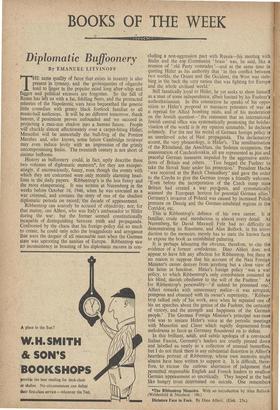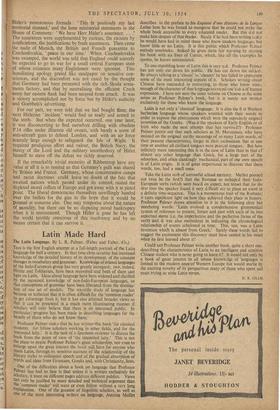BOOKS OF THE WEEK
Nal.M.■•■■••••■••
Diplomatic Buffoonery
By EMANUEL LITVINOFF THE same quality of farce that exists in insanity is also present in tyranny, and the grotesqueries of oligarchs tend to linger in the popular mind long after whip and faggot and political excesses are forgotten. So the fall of Rome has left us with a fat, fiddling Nero, and the protracted miseries of the Napoleonic wars have bequeathed the generic little comedian with greasy black forelock familiar to all music-hall audiencps. It will be no different tomorrow, thank heaven, if pessimism proves unfounded and we succeed in projecting a man-size shadow, into a human future. People will chuckle almost affectionately over a carpet-biting Hitler; Mussolini will be immortally the bull-frog of the Pontine Marshes and, who knows, some future Cambridge reviewer may even induce levity with an impression of the grimly uncompromising Stalin. The twentieth century is not short of sinister buffoons.
History as buffoonery could, in fact, aptly describe these two volumes of diplomatic memoirs*, for they are exasper- atingly, if unconsciously, funny, even though the events with which they are concerned were only recently alarming head- lines in the daily papers. Ribbentrop's is the less funny and the more exasperating. It was written at Nuremberg in the weeks before October 16, 1946, when he was executed as a war criminal, and contains the story of one of the shadiest diplomatic periods on record, 'the decade of appeasement.
Ribbentrop can scarcely be accused of objectivity, nor, for that matter, can Alfieri, who was Italy's ambassador to Hitler during the war: but the former seemed constitutionally incapable of distinguishing between truth and propaganda. Confronted by the chaos that his foreign Tolley did so much to create; he could only echo the braggadocio and arrogance that were the despair of all reasonable men when the German state was uprooting the sanities of Europe. Ribbentrop saw no inconsistency in boasting of his diplomatic success in con- eluding a non-aggression pact with Russia Otis meeting with Stalin and the top Communist brass' was, he said, like a reunion of ' old Party comrades '—and at the same time in quoting Hitler as his authority that in this conflict between two worlds, the Orient and the Occident, the West was stab- bing in the back the very nation that was fighting for Europe and the whole civilised world.'
Still fanatically loyal to Hitler, he yet seeks to show himself as .a man of some independence, albeit limited by his Fuehrer's authoritarianism. In this connection he speaks of his oppo- sition to Hitler's proposal to massacre prisoners of war as a reprisal for Allied bombing raids, and of his moderation on the Jewish question= the statement that an international Jewish central office was systematically promoting the bolshe- visation of the world is in my opinion untenable,' he declares solemnly. For the rest his recital of German foreign policy is an unrelieved echo of Nazi propaganda. The declamatory accent, the very phraseology, is Hitler's. The remilitarisation of the Rhineland, the Anschluss, the Sudeten occupation, the assassination of Czechoslovakia, all are represented as just and peaceful German measures impeded by the aggressive ambi- tions of Britain and others. Tiso begged the Fuehrer to take the Slovak State under his protection.' President Hacha was received at the Reich Chancellory' and gave the order to the Czechs to give the German troops a friendly welcome. `Even before the incorporation of the Czech rump state Britain had created a war psychosis, and systematically scanned the European horizon for potential German allies.' Germany's invasion of Poland was caused by increased Polish pressure on Danzig and the German-inhabited regions in the Corridor, etc.
This is Ribbentrop's defence of his own career. It is familiar, crude and mendacious in almost every detail. At Nuremberg, Sir David Maxwell Fyfe had no difficulty in demonstrating its flimsiness, and Alan Bullock, in his intro- duction to the memoirs, merely has to state the known facts to expose the book as uninhibited paltering.
It is perhaps labouring the obvious, therefore, to cite the evidence of a former confederate. Dino Alfieri does not appear to have felt any affection for Ribbentrop, but there is no reason to suppose that his account of the Nazi Foreign Minister's career derives from anything but a close view of the latter in function. Hitler's foreign policy ` was a war policy, to which Ribbentrop's only contribution consisted in his blind, slavish obedience to the will of the Fuehrer.' As for Ribbentrop's personality= if indeed' he possessed one,' Alfieri remarks with unnecessary malice—it was arrogant, pompous and obsessed with its owner's superiority. ` Ribben- trop talked only of his work, save when he repeated one of his set speeches about the genius of the Fuehrer, the certainty of victory, and the strength and happiness of the German people.' The German Foreign Minister's principal war-time role was to imitate Hitler's voice at the periodic meetings with Mussolini and Ciano which rapidly degenerated from melodrama to farce as Germany floundered on to defeat. In this brilliant, adult, and subtle apologia of a convinced Italian Fascist, Germany's leaders are cruelly pinned down and labelled as neatly as a collection of unusual butterflies, but I do not think there is any substantial distortion in Alfieri's heartless portrait of Ribbentrop, whose own memoirs might almost have been written to support it. It is difficult, there- fore, to excuse the curious aberration of judgement that permitted responsible English and French leaders to swallow German appeasement so uncritically. They leaped at the bait like hungry trout determined on suicide. One remembers The Ribbentrop Memoirs. With an introduction by Alan Bullock. (Weldenfeld & Nicolson. 18s.) Hitler's monotonous formula : ` This is positively my last territorial demand,' and the lame ministerial statements in the House of Commons : ' We have Herr Hitler's assurance. . . The assurances were supplemented by excuses, the excuses by justifications, the justifications by fresh assurances. Then came the nadir of Munich, the British and French guarantee to Czechoslovakia, ' peace in our time.' When Czechoslovakia was swamped, the world was told that England could scarcely be expected to go to war for a small central European state of whose existence many Englishmen were ignorant. This humiliating apology grated like sandpaper on sensitive con- sciences, and the discomfort was not eased by the thought that Germany had been presented with the rich .Skoda arma- ments factory, and that by neutralising the efficient Czech army her eastern flank had been secured from attack. It was a victory accomplished not by force but by Hitler's audacity and Goebbels's advertising.
For our part, we were told that we had bought time; the next Hitlerian ' incident' would find us ready and armed to the teeth. But when the expected occurred, one year later, it was disconcerting to find ourselves drilling with obsolete P.14 rifles under illiterate old sweats, with barely a score of anti-aircraft guns to defend London, and with an air force scarcely large enough to safeguard the Isle of Wight. It required prodigious effort and valour, the British Navy, the mercy of the Lord and the military unorthodoxy of Hitler himself to stave off the defeat we richly deserved.
If the remarkably trivial memoirs of Ribbentrop have any value at all it is to remind us that Germany's guilt was shared by Britain and France. Germany, whose concentration camps and racist doctrines could leave no doubt of the fate that awaited nations which passed under its control, raided the depleted moral coffers of Europe and got away with it at pistol point. The liberal democracies themselves unwillingly handed over the bullets for the gun in the hope that it would be pointed at someone else. One may temporise about the nature of morality, but there can be no disputing moral bankruptcy when it is encountered. Though Hitler is gone he has left the world terribly conscious of this insolvency and by no means certain that it can survive it.



































 Previous page
Previous page